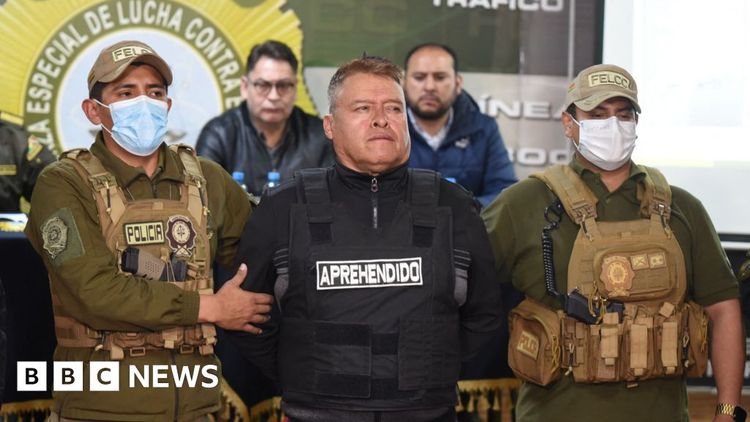Bolivian police arrest leader of coup attempt

Written by Will Grant, who covers Mexico, Central America, and Cuba for BBC News, along with contributions from Kathryn Armstrong and Ido Vock.
Check out this video of a heavily protected vehicle crashing into Bolivia's main government building.
In Bolivia, the police have apprehended the person in charge of a failed attempt to overthrow the government, following the event where military personnel raided the presidential palace in the city of La Paz.
Military vehicles and soldiers had positioned themselves at Murillo Square, where important government offices are located. However, they eventually retreated.
The leader of the rebel military faction, Gen Juan José Zúñiga, had expressed his desire to "reform democracy" and mentioned that although he currently respected President Luis Arce, he intended to change the government. He has since been taken into custody.
President Arce strongly criticized the failed coup, urging the people to come together and take action to support democracy.
"We cannot let another coup attempt endanger the lives of Bolivians," he stated during a live broadcast addressing the nation from the presidential residence.
His words clearly made an impact, as supporters of democracy marched in the streets to show their support for the government.
Mr. Arce also revealed that he was assigning new leaders in the military, confirming previous reports that Gen Zúñiga had been removed from his position for publicly criticizing Bolivia's previous leader, Evo Morales.
Mr. Morales also denounced the coup attempt and demanded that General Zúñiga and his "partners in crime" face legal consequences.
The district attorney's office has initiated a criminal inquiry.
General Juan Jose Zuniga was taken into custody after the failed overthrow of the government.
It's becoming more evident that the military uprising was brief and poorly thought out, rather than a widespread loss of control.
However, the next few weeks will be crucial in determining if Gen Zuñiga's military rebellion was an isolated event or part of a larger trend.
Surely, the government appears to be in a weaker position now, and there may be attempts by others to overthrow Mr. Arce's administration - but through political means rather than military force.
Additionally, he could rely on the backing of Evo Morales, the powerful ex-president and the respected leader of Bolivia's leftist movement.
Mr. Morales urged his followers, especially those within the country's indigenous coca-growers movement, to rally in the streets and advocate for an end to the alleged coup attempt.
The demonstration of strong public support likely bolstered opposition to General Zuñiga's proposals, which involved releasing "political prisoners" such as former leader Jeanine Áñez.
Speaking from Murillo Square after it was captured by troops, Gen Zúñiga declared, "We will reclaim this country."
A ruling class has conquered the nation, thugs who have ruined the country.
He lost his job after being on TV on Monday and saying he would take Mr. Morales into custody if he tried to run for office next year. Even though the ex-president is not allowed to run for office.
Soldiers stationed themselves outside important government buildings in La Paz.
In the past, Mr. Arce and Mr. Morales were friends, but they haven't agreed on many things lately. However, they both strongly criticized the use of soldiers to bring about political change in Bolivia.
In 2019, President Morales was pushed out by military leaders who claimed he was attempting to influence the outcome of a presidential election, leading to his exile in Mexico.
Prior to Evo Morales becoming president in 2005, Bolivia was known for its unpredictable politics. His leadership provided the country with the stability it desperately needed, but unfortunately, it did not last.
On his end, Mr. Arce - who was chosen after a time of uncertainty following the 2019 election - must have been encouraged by how quickly the neighboring countries reacted.
Friendly governments, such as those in Venezuela and Colombia, swiftly criticized the situation and called for democracy to win. The United States also urged for peace.
Even Bolivians who were against his socialist leadership would not want to go back to a time in South America when military forces, known for their horrible human rights violations, frequently overthrew democratically elected leaders using violence.
The people who support the government gathered in Cochabamba following reports of the attempted coup.













































